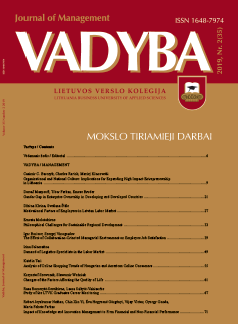IMPLEMENTATION OF THE SUSTAINABLE DEVELOPMENT GOALS
IN THE REPUBLIC OF LATVIA
IMPLEMENTATION OF THE SUSTAINABLE DEVELOPMENT GOALS
IN THE REPUBLIC OF LATVIA
Author(s): Jānis GrasisSubject(s): Law, Constitution, Jurisprudence, Human Ecology
Published by: Lietuvos verslo kolegija
Keywords: Preamble of the Satversme (Constitution); sustainable development; National Development Plan;
Summary/Abstract: European Union (EU) environmental law has had a significant impact on the direction of environmental policy, both at EU level and within each Member State. This has always been the case for environmental law and policy in the EU, yet the new strategic objective of a circular economy well demonstrates the close association in environmental policy of economic, social and environmental objectives. Beginning of the planning of sustainable development started in Latvia in early 1990s after regaining independence and when it was possible to launch own independent environmental policy. Latvian Parliament (Saeima) has adopted “Development Planning System Law”, which entered into force on January 1 2009 in order to promote sustainable development of the Republic of Latvia. The purpose of this mentioned law is to promote sustainable and stable development of the State, as well as the improvement of the quality of life of inhabitants, by determining the development planning system. “Latvia 2030” sustainable development strategy of Latvia was developed, starting with an analysis and survey of changes related to global processes: a) demographical changes – decrease in the number of inhabitants and their ageing; b) globalisation in economics and development of innovation economics; c) dynamics of the labour market and demand for new competences and skills; d) climate changes, threats to the biological diversity and nature as the environment of life; e) increasing demand for energy resources and energy safety; f) crisis of democratic representation institutions and emerging of new public participation forms; g) global development of the middle class and increase in relative poverty risks; and h) urbanisation, spreading of cities, regional positioning. Latvian National Development Plan 2014-2020 (NDP 2020) was adopted by announcement of Latvian Parliament (Saeima) on December 20, 2012. It definied a vision for Latvia in 2020: “The economic breakthrough - the growth of every citizen of Latvia and the country's well-being!” Author of the article agrees with Mr. J.Pleps, that “The Preamble of the Constitution entails specific State obligations which must be implemented with a specific national policy, regulatory enactments and financial support. The Preamble of the Constitution is the legal basis for State action, and it is also possible to ascertain the adequacy and appropriateness of State action in certain areas through legal proceedings. The Preamble of the Constitution has not been completed with its development and adoption, but requires certain state action in practical policy. The Preamble of the Constitution is not a political text but requires its implementation and implementation in the legal reality". As a result of this research the author has made the main conclusion: in order to plan National Development Plan 2021-2027 (NDP 2017) the main principles from Preamble of the Satversme (Constitution) of the Republic of Latvia must be taken as a basis for sustainable development plan: each individual takes care of oneself, one's relatives and the common good of society by acting responsibly toward other people, future generations, the environment and nature.
Journal: VADYBA
- Issue Year: 35/2019
- Issue No: 2
- Page Range: 111-116
- Page Count: 6
- Language: English

